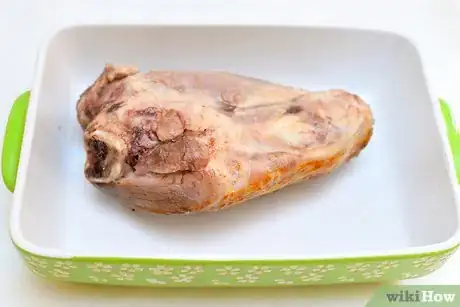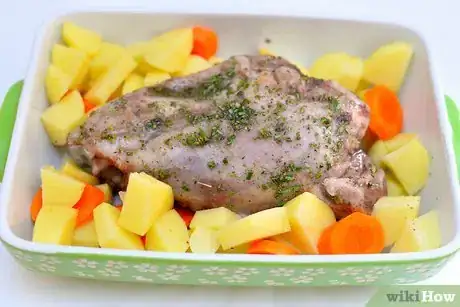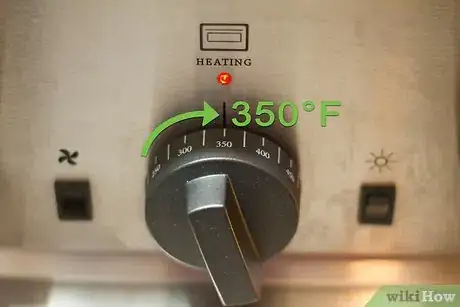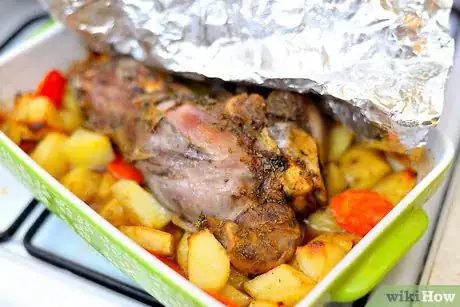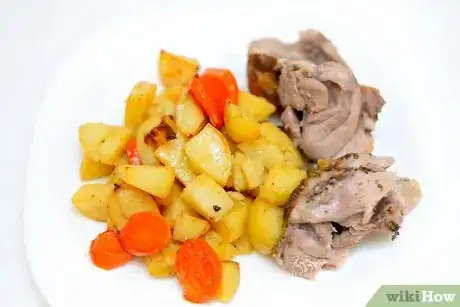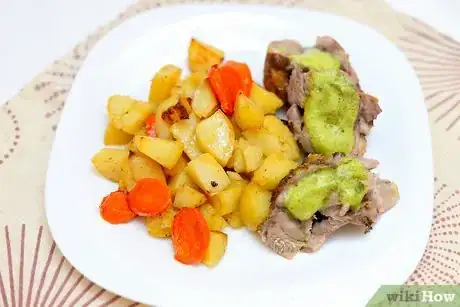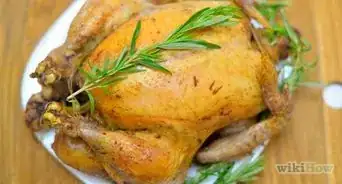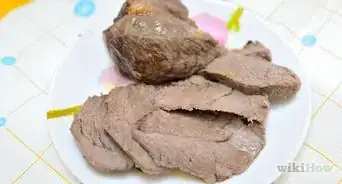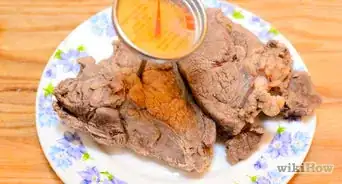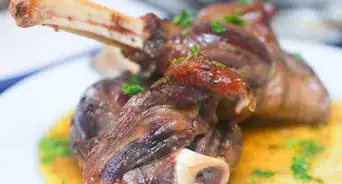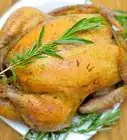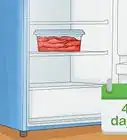This article was co-authored by Ollie George Cigliano. Ollie George Cigliano is a Private Chef, Food Educator, and Owner of Ollie George Cooks, based in Long Beach, California. With over 20 years of experience, she specializes in utilizing fresh, fun ingredients and mixing traditional and innovative cooking techniques. Ollie George holds a BA in Comparative Literature from The University of California, Berkeley, and a Nutrition and Healthy Living Certificate from eCornell University.
wikiHow marks an article as reader-approved once it receives enough positive feedback. In this case, several readers have written to tell us that this article was helpful to them, earning it our reader-approved status.
This article has been viewed 329,768 times.
Roast leg of lamb is traditional fare for holiday meals and special dinners. Roasting a leg of lamb is a simple process that starts with seasoning a bone-in leg of lamb, then roasting it for a few hours until the meat is flavorful and succulent. Roast lamb is often served with a bright mint sauce to offset its deep flavor.
Ingredients
- 1 leg of lamb, bone-in, about 6 pounds (1 pound of bone-in meat per serving)
- 6 cloves of garlic, peeled and minced
- 3 tablespoons fresh rosemary leaves
- 1 tablespoon salt
- 2 teaspoons black pepper
- Zest of 1 lemon
- 1/2 cup olive oil
- Optional: chopped new potatoes, carrots, or shelled green peas
- 1 cup of fresh mint leaves, finely chopped
- 1 teaspoon sugar
- 3 tablespoons wine vinegar
- 1 tablespoon hot water
Steps
Preparation
-
1Preheat the oven to 425 °F (218 °C). It takes only a few minutes to prepare the roast for cooking, so preheat the oven before you get started.[1]
-
2Place the leg of lamb in a roasting pan. Choose a metal, glass or ceramic pan that's just large enough to hold the entire leg of lamb. If you're roasting the lamb with vegetables, it's fine to use a slightly larger roasting pan.Advertisement
-
3Rub the lamb with herbs, spices and oil. Place the garlic, rosemary leaves, salt, pepper, and lemon zest in a bowl. Pour in the olive oil and mix well. Rub the mixture all over the leg of lamb.[2]
- If the mixture seems dry, add a bit more olive oil. You need enough of the rub to cover the entire leg of lamb.
- Make sure to cover the entire surface of the meat, so that each part cooks evenly and has great flavor.
- Use a small sharp knife to make about a dozen incisions, each about 2 inches deep, through the fat that covers the top of the meat, before seasoning.
-
4If you're roasting vegetables, add them to the roasting pan. Arrange them around the leg of lamb in a single layer, so that the vegetables cook evenly. As they cook, they'll absorb juices that run off the meat.
- Don't pile vegetables up the sides of the leg of lamb, since this may cause the lamb to cook unevenly.
- If you use russet potatoes, you might want to parboil them first to make sure they cook all the way through. Peel the potatoes and chop them coarsely. Bring a pot of water to a boil and boil the potatoes for 10 minutes, until they are halfway tender. Add them to the roasting pan when the meat is ready to cook.
Roast Lamb
-
1Roast the lamb for 15 minutes. Place the roasting pan in the oven and roast at a high temperature for half an hour. This will create a delicious crust around the leg of lamb.[3]
-
2Reduce the heat to 350 °F (177 °C) and continue roasting. Roast for another hour at this lower temperature to make sure the meat gets cooked all the way through. Use a meat thermometer to check the internal temperature of the lamb and determine if it's ready. Leg of lamb tastes best when it's cooked between medium rare and medium well.[4]
- For medium rare leg of lamb, remove the dish from the oven when the internal temperature has reached between 130 °F (54 °C)and 135 °F (57 °C).
- For medium or medium well leg of lamb, remove the dish from the oven when the internal temperature has reached between 150 and 155 degrees Fahrenheit.
-
3Allow the lamb to rest for 15 to 20 minutes. Tent aluminum foil over the baking dish and let the lamb rest. This gives the juices time to reabsorb into the meat, creating a succulent, tender dish. After 15 minutes, you may carve the lamb.[5]
Serving with Mint Sauce
-
1Whip up the mint sauce. Mix the mint, sugar, vinegar and water in a bowl. Use a whisk to whip the mixture until it's thoroughly incorporated.[6]
-
2Arrange slices of roast lamb on a platter. Place the slices in an artful pattern on a single platter, or put a few pieces on the plates you'll be serving to people.
-
3Pour a little mint sauce over the lamb. Use a spoon to ladle a little sauce over the lamb slices. Its bright flavor provides the perfect contrast to the deep umami of leg of lamb. As an alternative, you may serve the lamb with some of the juices from the bottom of the pan, to keep the meat moist.
-
4Finished.
Community Q&A
-
QuestionHow long do I bake a roast lamb without a bone?
 Community AnswerYou should cook it for 3 hours at 425 F. I know it seems like a lot, but that's how I've made it for my family for the past 4 years, and it's never stopped being perfect.
Community AnswerYou should cook it for 3 hours at 425 F. I know it seems like a lot, but that's how I've made it for my family for the past 4 years, and it's never stopped being perfect. -
QuestionCan I cook leg of lamb in a crockpot?
 HollyCommunity AnswerYes. Put the lamb on top of the potatoes and rub a few cloves of garlic over the surface, then sprinkle with salt. Toss in a few sprigs of rosemary and pour some wine in around the potatoes, cover (if the bone sticks out, cover the lid with foil to seal in the heat) and cook on low for 6-8 hours.
HollyCommunity AnswerYes. Put the lamb on top of the potatoes and rub a few cloves of garlic over the surface, then sprinkle with salt. Toss in a few sprigs of rosemary and pour some wine in around the potatoes, cover (if the bone sticks out, cover the lid with foil to seal in the heat) and cook on low for 6-8 hours. -
QuestionHow long should I cook a lamb roast on top of the stove?
 Community AnswerCooking anything in a Dutch Oven with a lid on top of the stove is essentially the same as using a crockpot. It's called braising, meaning low and slow, cooked in liquid. Sear the meat on each side with a tiny bit of oil (or rub oil all over the meat). Have a very hot pan so the meat hisses or sizzles when it hits the pan. As soon as it's seared (which you do to add flavor and to create and seal in juices), turn the heat very low, be sure it has plenty of liquid (red or white wine, broth, veg juice, cold coffee, or even water), put the lid on and forget it. Check back in an hour or so in case it needs more liquid or is cooking too fast. Braise for another hour or two. Add chopped onions, vegetables, for the last hour.
Community AnswerCooking anything in a Dutch Oven with a lid on top of the stove is essentially the same as using a crockpot. It's called braising, meaning low and slow, cooked in liquid. Sear the meat on each side with a tiny bit of oil (or rub oil all over the meat). Have a very hot pan so the meat hisses or sizzles when it hits the pan. As soon as it's seared (which you do to add flavor and to create and seal in juices), turn the heat very low, be sure it has plenty of liquid (red or white wine, broth, veg juice, cold coffee, or even water), put the lid on and forget it. Check back in an hour or so in case it needs more liquid or is cooking too fast. Braise for another hour or two. Add chopped onions, vegetables, for the last hour.
Warnings
- Take care to avoid oven burns and spattering hot oil or fat. Wear oven mitts when removing the dish from the oven and handling it.⧼thumbs_response⧽
- Oily stains should only be washed in hot water. Cold water will set an oil stain.[7]⧼thumbs_response⧽
Things You'll Need
- Oven
- Baking dish
- Serving platter
- Meat thermometer
- Carving knife
Expert Interview

Thanks for reading our article! If you'd like to learn more about cooking, check out our in-depth interview with Ollie George Cigliano.
References
- ↑ https://www.emerils.com/126826/rosemary-and-garlic-roast-leg-lamb
- ↑ https://www.foodnetwork.com/recipes/rosemary-and-garlic-roast-leg-of-lamb-3645315
- ↑ https://www.foodnetwork.com/recipes/rosemary-and-garlic-roast-leg-of-lamb-3645315
- ↑ https://www.foodnetwork.com/recipes/rosemary-and-garlic-roast-leg-of-lamb-3645315
- ↑ https://www.emerils.com/126826/rosemary-and-garlic-roast-leg-lamb
- ↑ https://www.saveur.com/article/Recipes/Mint-Sauce
- ↑ https://www.cleanipedia.com/gb/laundry/hot-water-or-cold-water-for-stains-which-is-best.html
About This Article
To cook roast lamb, start by putting the lamb in a roasting pan. Then, brush it with olive oil and your favorite seasonings, like garlic, rosemary, and lemon zest. Once you've seasoned the lamb, add any vegetables you want to roast with it to the pan and put it in the oven. Cook the lamb for 30 minutes at 400 °F and then an additional 30 minutes at 350 °F. Once it's done cooking, let the lamb rest for 15 minutes before serving. For a delicious mint sauce you can make to compliment your roast lamb, keep reading!

